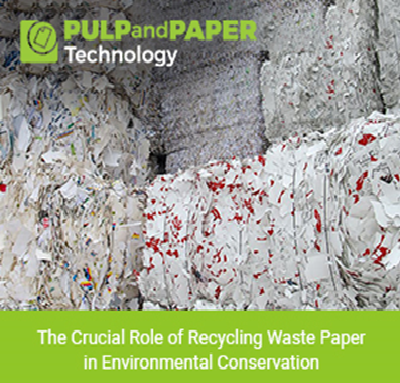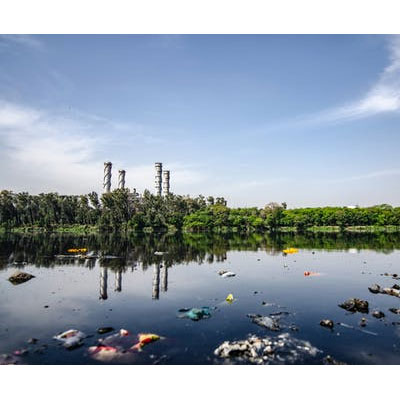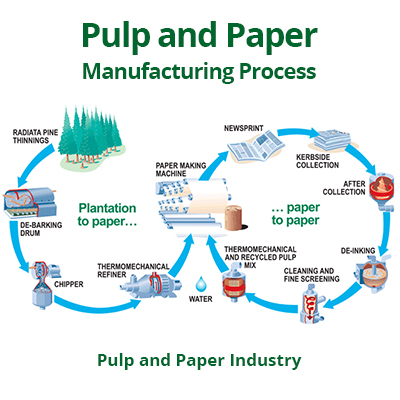The Crucial Role of Recycling Waste Paper in Environmental Conservation

Introduction:
Amidst growing environmental concerns, recycling waste paper has become a crucial element in the fight against environmental degradation. With global challenges like deforestation, resource depletion, and climate change, the value of recycling waste paper has gained unprecedented importance. This piece delves into the importance of recycling waste paper and its beneficial effects on the environment.
Understanding the Problem: Deforestation and Resource Depletion
Deforestation, often driven by the demand for paper production, contributes significantly to carbon emissions, loss of biodiversity, and disruption of natural ecosystems. Traditional paper production methods rely heavily on virgin wood pulp, leading to the depletion of valuable natural resources. Recycling waste paper offers a sustainable alternative by reducing the need for new wood pulp, subsequently conserving forests and protecting biodiversity.
The Benefits of Recycling Waste Paper:
1. Preserving Trees and Forests:
Forests are essential to Earth's ecosystem, absorbing carbon dioxide and generating oxygen. Yet, the demand for paper strains these ecosystems. Conventional paper manufacturing involves tree logging, causing deforestation and endangering various flora and fauna.
Recycling waste paper is a powerful strategy to counteract this negative impact. By diverting paper from landfills and reusing it in the production process, the need for fresh wood pulp is significantly reduced. This directly translates to the preservation of trees and forests worldwide.
Impact on Biodiversity: Forests are home to an astonishing array of species, many of which are still undiscovered. When trees are felled for paper production, these habitats are destroyed, and the species that rely on them are displaced or threatened. Recycling waste paper helps mitigate this disruption by decreasing the pressure on forests and allowing them to regenerate naturally.
Carbon Storage: Trees are pivotal in capturing and containing carbon dioxide, a significant greenhouse gas linked to climate change. When forests are cleared for paper, their carbon storage ability is forfeited, and the clearing process emits carbon. Recycling waste paper curbs these emissions by reducing logging and consequent carbon release.
Local and Global Climate Benefits: Intact forests contribute to the overall climate regulation of our planet. They influence temperature and precipitation patterns and help prevent soil erosion. By recycling waste paper, individuals and industries contribute to maintaining these climate-regulating functions, safeguarding both local and global ecosystems.
| Also Read: Next-Gen Paper Recycling Technologies: Advancements towards a Closed-Loop Circular Economy |
Sustainable Paper Production: The recycling process also encourages sustainable paper production practices. As the demand for recycled paper increases, industries are motivated to invest in more efficient recycling technologies and reduce their reliance on virgin wood pulp. This shift promotes a circular economy where resources are used more efficiently, waste is minimized, and the impact on forests is reduced.
Educational Opportunities: The act of recycling waste paper can also serve as an educational tool. By engaging in discussions about recycling and its impact on forests, individuals can raise awareness about the importance of conservation. This, in turn, might inspire others to join the movement and take steps towards a more sustainable future.
|
Also Read: The Economic Advantages of Paper Recycling: Cost Savings and More |
2. Energy and Water Savings:
In the pursuit of sustainable living and resource conservation, one of the most compelling reasons to recycle waste paper lies in the significant energy and water savings associated with the recycling process. Unlike traditional paper production, which demands substantial amounts of energy and water, recycling waste paper offers a more efficient and eco-friendly alternative.
Energy Efficiency in Recycling: The process of recycling waste paper requires far less energy compared to producing paper from raw materials. This is due to the fact that recycled paper fibers have already undergone the energy-intensive processes of pulping, bleaching, and refining. As a result, recycling waste paper consumes up to 50% less energy compared to producing paper from virgin pulp.
Reduction in Carbon Emissions: By reducing the energy demand, recycling waste paper helps lower carbon emissions. The energy-intensive stages of paper production, such as wood chipping, pulping, and drying, contribute to greenhouse gas emissions. By opting for recycled paper, individuals and industries indirectly contribute to the reduction of these emissions, thereby mitigating the impact of climate change.
Water Conservation through Recycling: Water scarcity is a pressing global issue, and industries are some of the largest water consumers. Traditional paper production requires vast amounts of water for wood processing, chemical treatment, and other manufacturing stages. In contrast, recycling waste paper uses significantly less water. This water savings is crucial for regions facing water stress and contributes to the overall effort to conserve this precious resource.
Reducing Environmental Pollution: Paper production generates various pollutants, including chemicals used in pulping and wastewater released during the manufacturing process. Recycling waste paper can help reduce the release of these pollutants into the environment. By using pre-processed paper fibers, the recycling process bypasses the need for many of these chemicals, leading to cleaner waterways and healthier ecosystems.
Economic Benefits: Apart from environmental advantages, energy and water-efficient recycling processes also offer economic benefits. Industries can experience reduced operational costs by minimizing energy consumption and optimizing water usage. Additionally, the recycling industry itself generates jobs and stimulates economic growth, contributing positively to local economies.
Consumer Empowerment: By actively choosing products made from recycled materials, consumers send a clear message to industries about their environmental priorities. This demand can encourage more businesses to adopt sustainable practices, thus driving broader shifts towards energy-efficient and eco-friendly production methods.\
|
Also Read: Paper Recycling: A Sustainable Solution for B2B Businesses |
3. Diminished Landfill Waste:
The problem of burgeoning landfills and the resulting environmental and health risks is now a worldwide apprehension. A robust remedy to confront this issue is the adoption of waste paper recycling. This not only eases the landfill strain but also brings forth an array of environmental advantages.
The Landfill Problem: Landfills are essentially massive repositories for waste, including various materials like paper, plastics, and organic matter. These landfills are not only eyesores but also contribute to pollution, groundwater contamination, and the emission of harmful gases like methane—a potent greenhouse gas. With landfills running out of capacity and the need for sustainable waste management practices growing, recycling waste paper emerges as a viable solution.
Diverting Waste from Landfills: Recycling waste paper diverts a significant portion of paper waste from ending up in landfills. When paper is recycled, it is processed and reconstituted into new paper products, extending its useful life and minimizing the need for disposal. By reducing the amount of paper waste in landfills, the pressure on these waste management sites is alleviated, leading to a reduction in environmental hazards.
Methane Emission Reduction: As organic matter in landfills decomposes, it produces methane—a gas with a far greater heat-trapping potential than carbon dioxide. By recycling waste paper, which contains organic content, the volume of organic material in landfills decreases. This, in turn, results in fewer methane emissions, contributing to climate change mitigation efforts.
Longer Landfill Lifespan: The more waste we divert from landfills, the longer these sites can be operational without expanding or creating new ones. Recycling waste paper helps stretch the lifespan of landfills, giving communities more time to transition to more sustainable waste management strategies.
Promoting Resource Efficiency: Landfills are essentially repositories of valuable resources that are discarded rather than reused. By recycling waste paper and other materials, we tap into these resources once again, reducing the demand for new raw materials and lessening the environmental impact of extraction and production.
Community and Aesthetic Improvement: Reducing landfill waste through recycling contributes to cleaner and healthier communities. Landfills are often associated with negative impacts on the local environment, including unsightly views and unpleasant odors. Recycling waste paper can improve the aesthetic appeal of communities and contribute to residents' overall well-being.
Individual and Collective Impact: While recycling waste paper might seem like a small step, its impact is significant when aggregated across individuals, communities, and industries. By making conscious choices to recycle, each person contributes to the larger goal of reducing landfill waste and creating a more sustainable waste management ecosystem.
4. Lower Carbon Footprint:
In an era where the global community is acutely aware of the need to curb greenhouse gas emissions, recycling waste paper stands out as a practical strategy to achieve a lower carbon footprint. By reducing the energy-intensive processes associated with paper production from virgin materials, recycling contributes directly to mitigating climate change and fostering a more sustainable world.
The Carbon Footprint of Paper Production: Traditional paper production involves a series of energy-intensive steps, including logging, transportation, pulping, bleaching, and drying. These processes collectively contribute to the release of significant amounts of carbon dioxide and other greenhouse gases into the atmosphere. This not only exacerbates global warming but also contributes to air pollution and environmental degradation.
Recycling's Impact on Carbon Emissions: Recycling waste paper drastically reduces the carbon emissions associated with paper production. When paper is recycled, it bypasses many of the energy-intensive stages involved in creating paper from raw materials. The recycled paper fibers have already undergone these processes, so the energy required for their transformation into new paper products is significantly lower.
Energy Savings and Emission Reductions: Studies indicate that recycling waste paper can save up to 70% of the energy required for virgin paper production. This substantial reduction in energy consumption directly translates to lower carbon emissions. By choosing products made from recycled paper, consumers contribute to the decreased demand for energy-intensive production methods, subsequently lowering their carbon footprint.
Climate Change Mitigation: The reduction in carbon emissions resulting from recycling waste paper contributes to global efforts to mitigate climate change. As governments, industries, and individuals work towards emission reduction targets, adopting practices like recycling becomes crucial. By minimizing carbon emissions, recycling waste paper helps slow down the pace of climate change and its associated negative impacts.
Promoting Sustainable Consumption: Recycling waste paper also encourages the adoption of a more sustainable lifestyle. When individuals actively choose products made from recycled materials, they create a demand for such products in the market. This, in turn, influences industries to adopt greener practices and invest in technologies that reduce their carbon footprint.
Circular Economy and Carbon Neutrality: The notion of a circular economy, emphasizing resource efficiency and waste reduction, harmonizes with the objectives of recycling waste paper. Through the recycling and reuse of paper items, we partake in a cycle of sustainable resource utilization, mitigating the demand for continuous raw material extraction. This transition in approach marks a pivotal stride toward attaining carbon neutrality and a more vibrant planet.
5. Economic Benefits of Recycling Waste Paper:
While the environmental advantages of recycling waste paper are widely recognized, it's important to highlight that this practice also brings about substantial economic benefits. From job creation to reduced waste management costs, embracing recycling contributes positively to local economies and global sustainability.
Job Creation and Industry Growth: Recycling waste paper fosters the growth of a vibrant and dynamic recycling industry. This industry generates a range of employment opportunities, from collection and sorting to processing and manufacturing. These jobs span various skill levels and contribute to economic stability within communities.
Resource Efficiency and Cost Savings: Recycling waste paper is inherently more resource-efficient than paper production from virgin materials. This efficiency translates to cost savings for industries. By utilizing recycled paper fibers, companies can reduce their consumption of raw materials, energy, and water. These cost reductions contribute to enhanced profitability and economic resilience.
Reduction in Waste Management Costs: As landfills become overcrowded, waste management costs soar. Municipalities and governments spend significant resources on managing, transporting, and disposing of waste. By recycling waste paper, a considerable portion of waste is diverted from landfills, leading to reduced waste management costs and improved allocation of public funds.
Advocacy for the Circular Economy: The circular economy framework strives to extend resource usage and extract optimum value from them. Recycling waste paper is integral to this framework. As the appetite for recycled materials rises, industries are motivated to pioneer inventive techniques for reclaiming and treating waste paper. This transition not only advances ecological sustainability but also propels economic progress through innovation.
Market Demand for Recycled Products: Consumer preferences are increasingly leaning towards sustainable and eco-friendly products. This shift in demand is prompting industries to incorporate recycled materials into their production processes. By choosing products made from recycled paper, consumers create a market demand that supports the growth of the recycling industry and encourages businesses to adopt greener practices.
Investment in Green Technologies: The growing interest in environmental sustainability is driving technological innovation. The recycling industry is no exception. Advancements in recycling technologies, such as improved paper de-inking processes and more efficient sorting systems, result in higher-quality recycled materials. These innovations attract investments that drive industry progress and contribute to economic advancement.
Environmental Cost Savings: Economic benefits derived from recycling waste paper extend beyond immediate financial gains. By reducing the strain on natural resources, conserving energy, and curbing greenhouse gas emissions, recycling contributes to avoiding the long-term economic costs associated with environmental degradation, such as healthcare expenses due to pollution-related illnesses.
How Individuals Can Make a Difference?
Recycling waste paper is a collective effort that involves individuals, businesses, and governments. Individuals can contribute by:
1. Segregating Waste: Properly segregating waste at home or in the workplace ensures that paper waste is separated from other types of waste, making recycling more effective.
2. Participating in Recycling Programs: Many communities offer curbside recycling programs that collect waste paper. Being part of such programs can simplify the recycling process for individuals.
3. Choosing Recycled Products: Opting for products made from recycled paper helps create demand for recycled materials, further supporting the recycling industry.
Conclusion: The Holistic Value of Recycling Waste Paper
In essence, recycling waste paper goes beyond environmental benefits, offering economic advantages, carbon footprint reduction, and waste management solutions. It's a tangible way for individuals and industries to drive positive change, contributing to a sustainable future for all.









